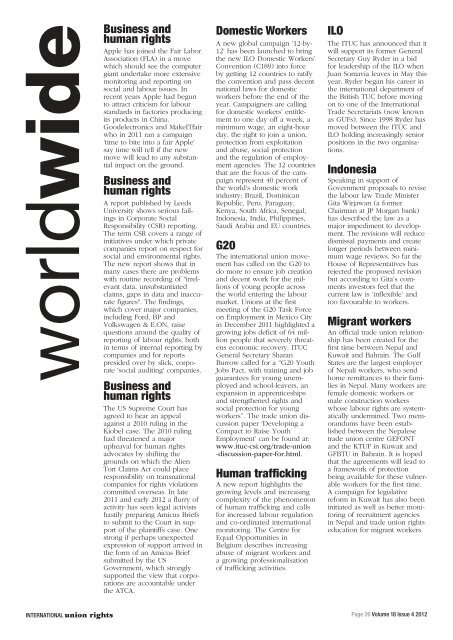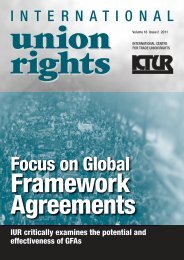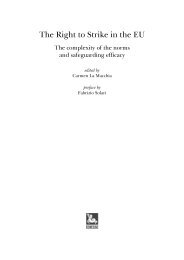International Centre for Trade Union Rights
International Centre for Trade Union Rights
International Centre for Trade Union Rights
You also want an ePaper? Increase the reach of your titles
YUMPU automatically turns print PDFs into web optimized ePapers that Google loves.
worldwide<br />
Business and<br />
human rights<br />
Apple has joined the Fair Labor<br />
Association (FLA) in a move<br />
which should see the computer<br />
giant undertake more extensive<br />
monitoring and reporting on<br />
social and labour issues. In<br />
recent years Apple had begun<br />
to attract criticism <strong>for</strong> labour<br />
standards in factories producing<br />
its products in China.<br />
Goodelectronics and MakeITfair<br />
who in 2011 ran a campaign<br />
‘time to bite into a fair Apple’<br />
say time will tell if the new<br />
move will lead to any substantial<br />
impact on the ground.<br />
Business and<br />
human rights<br />
A report published by Leeds<br />
University shows serious failings<br />
in Corporate Social<br />
Responsibility (CSR) reporting.<br />
The term CSR covers a range of<br />
initiatives under which private<br />
companies report on respect <strong>for</strong><br />
social and environmental rights.<br />
The new report shows that in<br />
many cases there are problems<br />
with routine recording of "irrelevant<br />
data, unsubstantiated<br />
claims, gaps in data and inaccurate<br />
figures". The findings,<br />
which cover major companies,<br />
including Ford, BP and<br />
Volkswagen & E.ON, raise<br />
questions around the quality of<br />
reporting of labour rights, both<br />
in terms of internal reporting by<br />
companies and <strong>for</strong> reports<br />
presided over by slick, corporate<br />
'social auditing' companies.<br />
Business and<br />
human rights<br />
The US Supreme Court has<br />
agreed to hear an appeal<br />
against a 2010 ruling in the<br />
Kiobel case. The 2010 ruling<br />
had threatened a major<br />
upheaval <strong>for</strong> human rights<br />
advocates by shifting the<br />
grounds on which the Alien<br />
Tort Claims Act could place<br />
responsibility on transnational<br />
companies <strong>for</strong> rights violations<br />
committed overseas. In late<br />
2011 and early 2012 a flurry of<br />
activity has seen legal activists<br />
hastily preparing Amicus Briefs<br />
to submit to the Court in support<br />
of the plaintiffs case. One<br />
strong if perhaps unexpected<br />
expression of support arrived in<br />
the <strong>for</strong>m of an Amicus Brief<br />
submitted by the US<br />
Government, which strongly<br />
supported the view that corporations<br />
are accountable under<br />
the ATCA.<br />
Domestic Workers<br />
A new global campaign ’12-by-<br />
12’ has been launched to bring<br />
the new ILO Domestic Workers’<br />
Convention (C189) into <strong>for</strong>ce<br />
by getting 12 countries to ratify<br />
the convention and pass decent<br />
national laws <strong>for</strong> domestic<br />
workers be<strong>for</strong>e the end of the<br />
year. Campaigners are calling<br />
<strong>for</strong> domestic workers’ entitlement<br />
to one day off a week, a<br />
minimum wage, an eight-hour<br />
day, the right to join a union,<br />
protection from exploitation<br />
and abuse, social protection<br />
and the regulation of employment<br />
agencies. The 12 countries<br />
that are the focus of the campaign<br />
represent 40 percent of<br />
the world’s domestic work<br />
industry: Brazil, Dominican<br />
Republic, Peru, Paraguay,<br />
Kenya, South Africa, Senegal,<br />
Indonesia, India, Philippines,<br />
Saudi Arabia and EU countries.<br />
G20<br />
The international union movement<br />
has called on the G20 to<br />
do more to ensure job creation<br />
and decent work <strong>for</strong> the millions<br />
of young people across<br />
the world entering the labour<br />
market. <strong>Union</strong>s at the first<br />
meeting of the G20 Task Force<br />
on Employment in Mexico City<br />
in December 2011 highlighted a<br />
growing jobs deficit of 64 million<br />
people that severely threatens<br />
economic recovery. ITUC<br />
General Secretary Sharan<br />
Burrow called <strong>for</strong> a “G20 Youth<br />
Jobs Pact, with training and job<br />
guarantees <strong>for</strong> young unemployed<br />
and school-leavers, an<br />
expansion in apprenticeships<br />
and strengthened rights and<br />
social protection <strong>for</strong> young<br />
workers”. The trade union discussion<br />
paper ‘Developing a<br />
Compact to Raise Youth<br />
Employment’ can be found at:<br />
www.ituc-csi.org/trade-union<br />
-discussion-paper-<strong>for</strong>.html.<br />
Human trafficking<br />
A new report highlights the<br />
growing levels and increasing<br />
complexity of the phenomenon<br />
of human trafficking and calls<br />
<strong>for</strong> increased labour regulation<br />
and co-ordinated international<br />
monitoring. The <strong>Centre</strong> <strong>for</strong><br />
Equal Opportunities in<br />
Belgium describes increasing<br />
abuse of migrant workers and<br />
a growing professionalisation<br />
of trafficking activities.<br />
ILO<br />
The ITUC has announced that it<br />
will support its <strong>for</strong>mer General<br />
Secretary Guy Ryder in a bid<br />
<strong>for</strong> leadership of the ILO when<br />
Juan Somavia leaves in May this<br />
year. Ryder began his career in<br />
the international department of<br />
the British TUC be<strong>for</strong>e moving<br />
on to one of the <strong>International</strong><br />
<strong>Trade</strong> Secretariats (now known<br />
as GUFs). Since 1998 Ryder has<br />
moved between the ITUC and<br />
ILO holding increasingly senior<br />
positions in the two organisations.<br />
Indonesia<br />
Speaking in support of<br />
Government proposals to revise<br />
the labour law <strong>Trade</strong> Minister<br />
Gita Wirjawan (a <strong>for</strong>mer<br />
Chairman at JP Morgan bank)<br />
has described the law as a<br />
major impediment to development.<br />
The revisions will reduce<br />
dismissal payments and create<br />
longer periods between minimum<br />
wage reviews. So far the<br />
House of Representatives has<br />
rejected the proposed revision<br />
but according to Gita’s comments<br />
investors feel that the<br />
current law is ‘inflexible’ and<br />
too favourable to workers.<br />
Migrant workers<br />
An official trade union relationship<br />
has been created <strong>for</strong> the<br />
first time between Nepal and<br />
Kuwait and Bahrain. The Gulf<br />
States are the largest employer<br />
of Nepali workers, who send<br />
home remittances to their families<br />
in Nepal. Many workers are<br />
female domestic workers or<br />
male construction workers<br />
whose labour rights are systematically<br />
undermined. Two memorandums<br />
have been established<br />
between the Nepalese<br />
trade union centre GEFONT<br />
and the KTUF in Kuwait and<br />
GFBTU in Bahrain. It is hoped<br />
that the agreements will lead to<br />
a framework of protection<br />
being available <strong>for</strong> these vulnerable<br />
workers <strong>for</strong> the first time.<br />
A campaign <strong>for</strong> legislative<br />
re<strong>for</strong>m in Kuwait has also been<br />
initiated as well as better monitoring<br />
of recruitment agencies<br />
in Nepal and trade union rights<br />
education <strong>for</strong> migrant workers.<br />
INTERNATIONAL union rights Page 26 Volume 18 Issue 4 2012





